De Nederlandse dichter en schrijver Michel van der Plas werd geboren op 23 oktober 1927 in Den Haag. Zie ook alle tags voor Michel van der Plas op dit blog.
Bezoekje
Al is het wel wat lang geleden
dat ‘k op een doordeweekse dag
hier neergeknield heb en gebeden,
toch weet ik, Heer, gij zijt tevreden
met mijn doorgaans gevolgd gedrag.
Ik heb geen kwaad op mijn geweten,
want ‘k bleef mijn man in kuisheid trouw;
en had ik Vrijdags vlees gegeten
of de collecte weer vergeten,
dan had ik steeds oprecht berouw.
Ik ben niet als dat mens van Poole,
dat weet u: ik deed Kees en Jeanne
op goede katholieke scholen
en van jongsaf heb ‘k ze bevolen
om Zondags naar de mis te gaan.
Ik mag u rustig alles vragen;
dat heeft de kapelaan gezegd,
toen ’t na de Quatertemperdagen
de derde roep was van Jan Hagen
met dat mooi nummer van Van Echt.
Ik bid u, Heer, voor Zuid-Korea,
dat het niet overslaat naar hier,
en dan, voor Zondag als ‘k met Thea,
de zuster van mijn man, naar zee ga
om prachtig weer en veel plezier.
Verhoed toch dat u ook de Russen
de atoombom produceren laat,
en u moet ook dat kind eens sussen
van de overkant, dat ’s nachts steeds tussen
half drie en drie zo schreeuwen gaat.
Berisp ook eindelijk eens mijn zwager,
die fout was, om zijn grote mond,
en help me onthouden dat ‘k de slager
straks nog moet bellen om een mager
kalfslapje van een hallef pond.
Ik bid u voor de negerkindren,
die nog niet weten wie gij zijt,
maar als ze ooit de Shell gaan hindren
moet gij hun aantal maar vermindren,
O Heer, in uw voorzienigheid.
Bescherm ons kleine, dappre landje,
vooral de Roomse minderheid,
en geef Verheul, dat protestantje,
nu eindlijk eens een ernstig standje
als hij mijn man zijn zaak vermijdt.
En houd, wanneer de Russen komen,
vooral toch Hoogstraat 6 in ’t oog,
want gij zijt altijd met de vromen
die vredig van de hemel dromen
en naarstig streven naar omhoog.
En laat Kees slagen voor ’t examen,
en geef Jeanne’s jongen beter werk,
en houd ons allemaal lang samen,
tot later in de hemel, amen.
Wat doet die Dijkstra in de kerk?
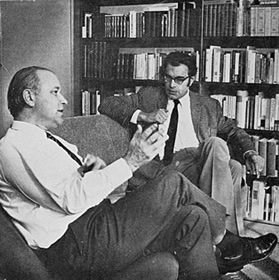
Michel van der Plas (23 oktober 1927 -21 juli 2013)
Hier links in gesprek met Godfried Bomans in 1969
De Albanees-Amerikaanse schrijfster en actrice Masiela Lusha werd geboren op 23 oktober 1985 in Tirana. Zie ook alle tags voor Masiela Lusha op dit blog.
Eternity
A carved stone can reign like a mountain,
Only to be meat in natures jaw.
But no wind or snow can tumble
Into the steel minds of humanity and memory-
Of books and history.
Fire
Near. So near that you can kiss me.
I can see the gods dancing
Inside your belly,
And they break away star by star
From the tips of your curling
Fingers pointing up to their bed of waiting
Companions.
You release them, and you send them away.
And I watch, your color tied to me
Like a glowing sigh. And the illusion
Of a kiss. You don’t need to touch me
For us to dance to the songs of my heart;
You are a belly dancer who never leaves
Your stage of broken nature.
But others will leave their silly stage of comfort
For you. And your price? Their lives.
You seduce the wind, and you seduce my cleverness,
And like the wind, my airy thoughts
Tumble and curve to you,
Hidden and lost to the dark bends of your nature.
And I drift, like a plucked leaf, to your imploding swells of heat-
Drawing me near, so near that you can kiss me.

Masiela Lusha (Tirana, 23 oktober 1985)
De Amerikaanse schrijver Augusten Xon Burroughs werd geboren op 23 oktober 1965 in Pittsburgh, Pennsylvania. Zie ook alle tags voor Augusten Burroughs op dit blog.
Uit: A Wolf at the Table. A Memoir of My Father
“I am wet-faced and shrieking. I am alone in the awake-pit with the terrible bright above my head. I need: my mother, my silky yellow blanket, to be lifted, to be placed back in my box. I am crying but my mother doesn’t come to pick me up and this makes me mad and afraid and mad again, so I cry harder.
On the other side of the door, he is laughing. He is my brother. He’s like me but he’s not me. We’re linked somehow and he’s home but he’s not home, like my mother and her voice.
Opposite this door against the wall, there is a dresser with drawers that my mother can open but I cannot, no matter how hard I pull. The scent of baby powder and Desitin stains the air near the dresser. These smells make me want to pee. I don’t want to be wet so I stand far away from the dresser.
This is my first whole memory — locked alone in my room with my brother on the other side of the door, laughing.
There is another memory, later. I am in the basement sitting on a mountain of clothing. The washer and dryer are living pets; friendly with rumbling bellies. My mother feeds them clothing. She is lifting away pieces of my mountain, placing them into the mouth of the washer. Gradually, my mountain becomes smaller until I can feel the cool of the cellar floor beneath me.
A form on the wooden stairs. The steps themselves smell sweet and I like to lick them but they are coarse and salty; they don’t taste as they smell and this always puzzles me and I lick again, to make sure. The thing on the stairs has no face, no voice. It descends, passes before me. I am silent, curious. I don’t know what it is but it lives here, too. It is like a shadow, but thick, somehow important. Sometimes it makes a loud noise and I cover my ears. And sometimes it goes away.
“Did my father live with us at the farmhouse in Hadley?”
I was in my twenties when I called my mother and asked this question. The farmhouse — white clapboard with black shutters and a slate roof — sat in a brief grassy pasture at the foot of a low mountain range. I could remember looking at it from the car, reaching my fingers out the window to pluck it from the field because it appeared so tiny. I didn’t understand why I couldn’t grab it, because it was just right there.“
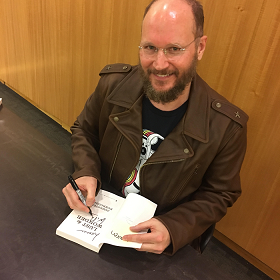
Augusten Burroughs (Pittsburgh, 23 oktober 1965)
De Engelse dichter, toneel- en prozaschrijver Robert Seymour Bridges werd geboren in Walmer, Kent, op 23 oktober 1844. Zie ook alle tags voor Robert Bridges op dit blog.
I Have Loved Flowers That Fade
I have loved flowers that fade,
Within whose magic tents
Rich hues have marriage made
With sweet unmemoried scents:
A honeymoon delight-
A joy of love at sight,
That ages in an hour-
My song be like a flower!
I have loved airs that die
Before their charm is writ
Along a liquid sky
Trembling to welcome it.
Notes, that with pulse of fire
Proclaim the spirit’s desire,
Then die, and are nowhere-
My song be like an air!
Die, song, die like a breath,
And wither as a bloom;
Fear not a flowery death,
Dread not an airy tomb!
Fly with delight, fly hence!
‘Twas thine love’s tender sense
To feast; now on thy bier
Beauty shall shed a tear.
The evening darkens over
The evening darkens over
After a day so bright
The windcapt waves discover
That wild will be the night.
There’s sound of distant thunder.
The latest sea-birds hover
Along the cliff’s sheer height;
As in the memory wander
Last flutterings of delight,
White wings lost on the white.
There’s not a ship in sight;
And as the sun goes under
Thick clouds conspire to cover
The moon that should rise yonder.
Thou art alone, fond lover.
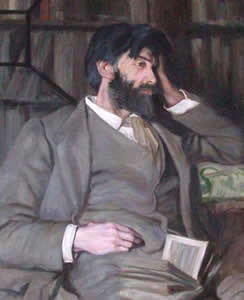
Robert Bridges (23 oktober 1844 – 21 april 1930)
Portret door Charles Furse, 1894
De Oostenrijkse schrijver Adalbert Stifter werd geboren in Oberplan op 23 oktober 1805. Zie ook alle tags voor Adalbert Stifter dit blog.
Uit: Der Nachsommer
„Der Vater hatte auch einen Kasten, in welchem Münzen waren, von denen er uns zuweilen einige zeigte. Da befanden sich vorzüglich schöne Taler, auf welchen geharnischte Männer standen oder die Angesichter mit unendlich vielen Locken zeigten, dann waren einige aus sehr alten Zeiten mit wunderschönen Köpfen von Jünglingen oder Frauen, und eine mit einem Manne, der Flügel an den Füßen hatte. Er besaß auch Steine, in welche Dinge geschnitten waren. Er hielt diese Steine sehr hoch und sagte, sie stammen aus dem kunstgeübtesten Volke alter Zeiten, nehmlich aus dem alten Griechenlande her. Manchmal zeigte er sie Freunden; diese standen lange an dem Kästchen derselben, hielten den einen oder den andern in ihren Händen und sprachen darüber.
Zuweilen kamen Menschen zu uns, aber nicht oft. Manches Mal wurden Kinder zu uns eingeladen, mit denen wir spielen durften, und öfter gingen wir auch mit den Eltern zu Leuten, welche Kinder hatten, und uns Spiele veranstalteten. Den Unterricht erhielten wir in dem Hause von Lehrern, und dieser Unterricht und die sogenannten Arbeitsstunden, in denen von uns Kindern das verrichtet werden mußte, was uns als Geschäft aufgetragen war, bildeten den regelmäßigen Verlauf der Zeit, von welchem nicht abgewichen werden durfte.
Die Mutter war eine freundliche Frau, die uns Kinder ungemein liebte, und die weit eher ein Abweichen von dem angegebenen Zeitenlaufe zugunsten einer Lust gestattet hätte, wenn sie nicht von der Furcht vor dem Vater davon abgehalten worden wäre. Sie ging in dem Hause emsig herum, besorgte alles, ordnete alles, ließ aus der obgenannten Furcht keine Ausnahme zu und war uns ein ebenso ehrwürdiges Bildnis des Guten wie der Vater, von welchem Bildnisse gar nichts abgeändert werden konnte. Zu Hause hatte sie gewöhnlich sehr einfache Kleider an. Nur zuweilen, wenn sie mit dem Vater irgend wohin gehen mußte, tat sie ihre stattlichen seidenen Kleider an und nahm ihren Schmuck, daß wir meinten, sie sei wie eine Fee, welche in unsern Bilderbüchern abgebildet war. Dabei fiel uns auf, daß sie immer ganz einfache, obwohl sehr glänzende Steine hatte, und daß ihr der Vater nie die geschnittenen umhing, von denen er doch sagte, daß sie so schöne Gestalten in sich hätten.
Da wir Kinder noch sehr jung waren, brachte die Mutter den Sommer immer mit uns auf dem Lande zu. Der Vater konnte uns nicht Gesellschaft leisten, weil ihn seine Geschäfte in der Stadt festhielten; aber an jedem Sonntage und an jedem Festtage kam er, blieb den ganzen Tag bei uns und ließ sich von uns beherbergen. Im Laufe der Woche besuchten wir ihn einmal, bisweilen auch zweimal in der Stadt, in welchem Falle er uns dann bewirtete und beherbergte.“
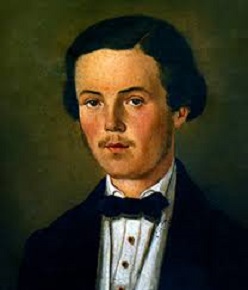
Adalbert Stifter (23 oktober 1805 – 28 januari 1868)
In 1820. Portret in zijn geboortehuis in Horní Planá (Oberplan)
De Amerikaanse dichter, schrijver en journalist Nick Tosches werd geboren op 23 oktober 1949 in Newark, New Jersey. Zie ook alle tags voor Nick Tosches op dit blog.
Uit: Dino: Living High in the Dirty Business of Dreams
“His schoolmates had never really known him. Even his loving familiy could not tell for sure what lay within this kid who moseyed around among them with a hat on, singing. There was a pin-tumbler sidebar lock on his guts that no one could pick. That was just the way he was, and it was just the way he always would be.
Unlettered and rough-cut, Dino possessed both wiles and wisdom beyond his years – anyone trying to fuck with his mind or his body or his soul found this out forthwith. But the wisdom served by those wiles was an annihilating wisdom. It was the wisdom of the old ways, a wisdom through which the seductions of reason and love and truth and all such frail and flimsy lepidoptera would in their seasons emerge and thrive, wither and die. The sum of Dino’s instincts had to do with the old ways, those ways that were like a wall, ways that kept the world lontano, as the mafiosi would say: distant, safely and wisely at bay. That was how he liked it: lontano, like the flickering images on the theater screen that gave him pleasure as he sat alone, apart from them and unknown to them, in the dark.
Those close to him could sense it: He was there, but he was not really there; a part of them, but apart from them as well. The glint in his eye was disarming, so captivating and so chilling at once, like lantern-light gleaming on nighttime sea: the tiny soft twinkling so gaily inviting, belying for an instant, then illuminating, a vast unseen cold blackness beneath and beyond. The secret in its depth seemed to be the most horrible secret of all: that there was no secret, no mystery other than that which resides, not as a puzzle to be solved or a revelation to be discovered, but as blank immanence, in emptiness itself.“

Nick Tosches (Newark, 23 oktober 1949)
Dean Martin in 1964
De Duitse dichter, schrijver en uitgever Rodja Weigand werd geboren op 23 oktober 1945 in München. Zie ook alle tags voor Rodja Weigand op dit blog en ook mijn blog van 23 oktober 2010.
das lied des victor jara
netze werfen sie
über die schwingen
des condors und
binden ihn fest
mit eisenschellen
am andenfels.
lautlos klingt
das lied victor jaras
unter dem orkan in
abgehackten kadenzen
sanft
wie die stimme
der frau.
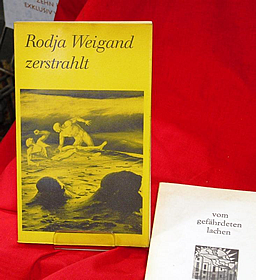
Rodja Weigand (München, 23 oktober 1945)
Cover
De Albanese dichter, vertaler en pater Franciscaan Gjergj Fishta werd geboren op 23 oktober 1871 in Fishta të Zadrimes. Zie ook alle tags voor Gjergj Fishta op dit blog.
THE HIGHLAND LUTE (fragment)
When the Turk had read the message
He was filled with rage and anger.
How he set upon the land to
Eat them up alive, those tribesmen.
But the Albanians were resolved
He’d not devour or invade them.
They had come to a decision,
For their land they’d muster courage,
If attacked by king or sultan.
Thus the Turk and the Albanian
Seized each others’ throats and strangled,
Smashed each others’ skulls to pieces,
Crushed them like so many pumpkins!
Fire broke out then in the Balkans.
The shkja, in anguish that Albania,
Freed now of the sultan’s power,
Might not fall into his clutches
As he had foreseen the matter,
Set upon the Turk like lightning,
Like the wild boar with the jackal.
They did haggle and did grapple,
Scuffled, wrestled, bit and murdered,
Rifles volleyed, cannons battered,
Blood in torrents swashed the clearings,
Over fields and through the thickets,
‘Til at last, midst din and clamour,
Of the Turkish yoke released,
As she’d wanted, was Albania,
Free at last, as God had promised,
But no, brothers, do believe me,
Not as Turk or shkja would have it.
That the Turk begrudged our freedom
I can understand, but don’t know
What got into Prince Nikolla,
Forcing to submit Albanians,
Crush them under heel, enslave them,
And to seize that land where once
In ancient times Gjergj Castriota
Brandished in a flash his sabre.
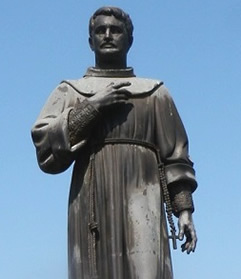
Gjergj Fishta ( 23 oktober 1871 – 30 december 1940)
Monument in Lezhë
De Franse schrijver Nicolas Edmonde Restif de La Bretonne werd geboren op 23 oktober 1734 in Sacy bij Auxerre. Zie ook alle tags voor Réstif de la Bretonne op mijn blog.
Uit: La vie de mon père
« Je ne veux peindre le vénérable Berthier que par ses actions : je les ai déja consi-gnées dans l’école des pères, ouvrage que j’ai rédigé de plénitude de cœur; oit j’ai rapportai ce que j’ai vu, & ce que j’ai en-tendu : Voici le passage; il est la suite d’un autre qu’on doit trouver à la fin de cet ouvrage, & qui offre de même le portrait du vénérable Curé. C’est mon Père qui parle.
—Notre Maître d’école ébauchait l’ou-vrage du Pasteur, & l’achevait. Je m’explique. Il commençait â donner les premiers élémens aux Enfans , & faisait aux grands Garsons & aux grandes Filles des leçons familières sur la conduite ordinaire de la vie , entre Mari & Femme, Frères & Soeurs, &c. Comme il était marié, & père d’une nombreuse Famille, ses conseils ne paraissaient que le fruit de son expérience : cependant on a su depuis , que tout était prémédité avec le Pasteur. Deux fois l’an, on avait des vacances, pour la récolte des grains, & pour les vendanges: il ne rentrait même que peu d’Écoliers après les moissons; le grand nombre attendaient la fin des gros ouvrages. Les jours fixés étaient le dernier juin pour la clôture, & le 20 octobre pour la rentrée : il n’y avait point de leçons ces deux jours-la le bon Vieillard consacrait le temps de la classe â des discours, que je ne puis me rappeler fans attendrissement.
Celui de juin roulait sur les torts qu’on pouvait faire au Prochain dans la campagne, durant les récoltes, & sur l’emploi des heures de relâche que les travaux pouvaient laisser.”
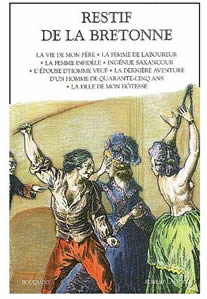
Réstif de la Bretonne (23 oktober 1734 – 3 februari 1806)
Cover
